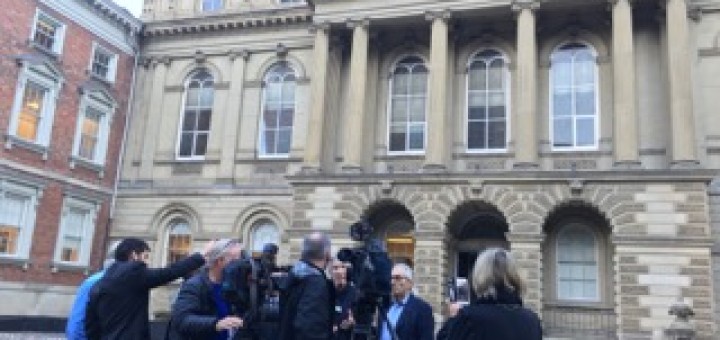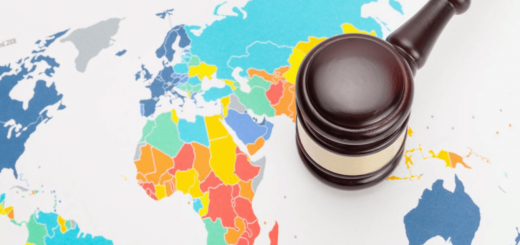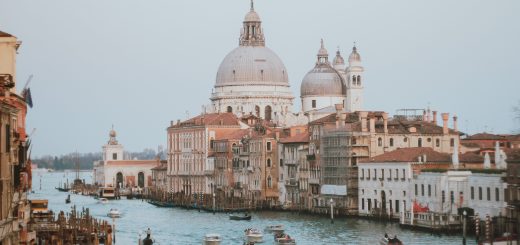Goliath Strikes Back: The Yaiguaje v Chevron Saga Continues

After the underdog Ecuadorians’ victory in Chevron Corp v Yaiguaje, 2015 SCC 42, which established that judgements against foreign corporations can be enforced against Canadian subsidiaries, the Goliath Chevron Corporation has struck back with a potentially debilitating blow to the Ecuadorians seeking enforcement of their $9.5 billion award with a motion for security costs.
A Long Time Ago
The Chevron saga dates as far back as 1964 when Texaco Inc., which merged with Chevron in 2003, began extracting oil in the Oriente region of Ecuador. Texaco’s practices, which involved cutting corners in safety and clean-up, resulted in extensive environmental damage and pollution. In 1993, Daniel Carlos Lusitande Yaiguaje and 46 other representatives of over 30,000 Indigenous Ecuadorian villagers filed suit against Texaco for negligence in New York, where Texaco was then headquartered. After drawn out proceedings, in 2001 the New York court dismissed the suit on a finding of forum non conveniens. The plaintiffs then filed suit two years later in Ecuador, which likewise took several years to decide. Finally, in 2011, the Ecuadorian court awarded the plaintiffs $9.5 billion in damages.
In a Jurisdiction Not Far Away
Before the Ecuadorian judgement was even released, a Chevron spokesperson insisted that the company will “fight this until hell freezes over. And then we’ll fight it out on the ice” (Yaiguaje v Chevron Corporation, 2013 ONCA 758 at para 74). Not surprisingly, Chevron has refused to pay the Ecuadorians. Moreover, since the company has no assets in Ecuador, the plaintiffs have sought enforcement of the payment in other jurisdictions. In 2012, the Second Circuit US Court of Appeals found that the plaintiffs could “seek to enforce that judgment in any country in the world where Chevron has assets” (Chevron Corp v Naranjo, 667 F.3d 232 (2d Cir. 2012). However, Chevron fought the Ecuadorian judgement by filing a RICO suit, a civil cause of action for organized crime under the US Federal Racketeer Influenced and Corrupt Organizations Act, against the plaintiffs and their American lawyer, Steven Donziger, alleging that he had ghost-written the Ecuadorian judgement and bribed the judge. In the controversial proceedings, Judge Kaplan of the Southern District of New York forced Joe Berlinger, an independent filmmaker who documented the Ecuadorian suit in Crude, to turn over more than 600 hours of outtakes, despite the protests of Robert Redford, Michael Moore, and the Academy of Motion Picture Arts and Sciences, who voiced concerned over the effect of Judge Kaplan’s decision for the relationship between journalist and their subject. In Chevron Corp v Donziger, 974 F.Supp.2d 362 (SDNY 2014), Judge Kaplan found that the Ecuadorian judgement was the result of Donziger’s fraud. Despite the fact that this American judgement may also be plagued by corruption, with groups such as Amazon Watch claiming that Chevron bribed one of their RICO witnesses, nevertheless it has prevented the Indigenous Ecuadorian villagers from enforcing payment in the United States.
A New Hope
Without recourse in Ecuador and the United States, the plaintiffs turned to Canada to seek enforcement. In 2012, they brought an action for recognition and enforcement according to rule 17.02 of the Ontario Rules of Civil Procedure in the Superior Court of Justice [ONSC] against Chevron and Chevron Canada, which operates in Mississauga. Rule 17.02 stipulates that a party may serve an originating process for a claim in respect to property in Ontario (a) and “on a judgment of a court outside Ontario” (m). The ONSC (2013 ONSC 2527) ruled in favour of the Ecuadorian plaintiffs, finding that a motion for recognition and enforcement does not require a real and substantial connection between Ontario and the foreign judgement debtor or the subject matter of the judgement. However, the motion judge also exercised the court’s power under s. 106 of the Courts of Justice Act, RSO 1990, c C.43 [CJA] to stay a proceeding “on its own initiative” because Chevron does not have assets in Ontario and does not own shares of Chevron Canada which is a separate corporate personality.
The Ontario Court of Appeal (2013 ONCA 758) [ONCA] set aside the motion judge’s stay of proceedings, finding that s. 106 of the CJA should only be used in very rare circumstances and that:
After all these years, the Ecuadorian plaintiffs deserve to have the recognition and enforcement of the Ecuadorian judgment heard on the merits in an appropriate jurisdiction. At this juncture, Ontario is that jurisdiction. (para 75)
The SCC agreed, noting that the doctrine of comity, which the Court has recognized as “the deference and respect due by other states to the actions of a state legitimately taken within its territory” (para 51), must evolve with the progress of international business relations and so requires “an increasing willingness on the part of courts to recognize the acts of other states” (para 75). Although the Court found that jurisdiction existed in Ontario over the plaintiffs’ action for recovery and enforcement, it emphasized that this does not guarantee them success, and the defendants are still open to argue forum non conveniens or defences such as fraud (para 77). For further background and commentary on the Court’s decision, see David beats Goliath? Not quite. Jurisdictional analyses in Chevron Corp v Yaiguaje and Chevron v Yaiguaje: Small Step for the Plaintiffs, (Relatively) Small Step for Mankind.
Fight on the Ice
Following the SCC’s decision, Chevron and Chevron Canada brought a summary judgment motion in the ONSC to dismiss the Ecuadorians’ claims against Chevron Canada, arguing that it is a separate corporate entity from Chevron. The plaintiffs filed a cross-motion seeking a declaration that Chevron Canada’s assets were exigible to pay for Chevron’s judgement debt. The motion judge granted Chevron’s motions and dismissed the Ecuadorians’ cross-motion (2017 ONSC 135). The plaintiffs have appealed the judgment to the ONCA. Possibly in an effort to intimidate the Ecuadorians to give up the fight, Chevron responded by filing a motion for security costs for the appeal and the proceedings below under rules 61.06(1)(b) and 56.01(1)(a) of the Rules of Civil Procedure. Despite the ludicrous optics of a multibillion-dollar corporation claiming security costs from Indigenous villagers, Justice Epstein ordered the Ecuadorian plaintiffs to pay security for costs in the amount of $591,335.14 to Chevron Canada and $351,616.33 to Chevron (para 6).
Resident Outside Ontario
Because the plaintiffs are from Ecuador, Chevron easily meets the onus of rule 56.01(1)(a), which allows a defendant or respondent to make a motion for security for costs where the plaintiff/applicant “is ordinarily resident outside Ontario.” This “triggers the enquiry” into security for costs which requires the court to consider a number of factors including “the merits of the claim and the possible effect of an order for security preventing a bona fide claim from proceeding” (para 25).
Impecuniosity
In a security for costs inquiry, it is open for the plaintiffs to demonstrate impecuniosity, by giving evidence with “robust particularity…full and frank disclosure, and supporting documentation as to income, expenses and liability” (para 30). Epstein J.A. noted that the plaintiffs only filed three settlement agreements between Chevron and third parties who had previously funded the Ecuadorian plaintiffs, and found that was insufficient to demonstrate that the plaintiffs were impecunious (para 31). Epstein J.A. found that these settlement agreements demonstrate previous funding for this litigation (despite the third parties withdrawing their financial support after the New York RICO decision), and the plaintiffs failed to demonstrate whether they have other funding (para 32). Potential assumptions about the financial situation of the plaintiffs aside, it seems strange that Epstein J.A. did not even touch on the possibility that it could be difficult for the Indigenous Ecuadorian villagers to adduce evidence of their income and expenses. In general, this evidentiary requirement for impecuniosity seems counterintuitive because those who are truly impecunious may not have supporting documentation such as bank statements or even income and so would not have the ability to provide evidence with “robust particularity.”
Merits
When a plaintiff is not impecunious a judge will usually award security for costs unless the responding party can show they are likely to succeed in their action. Therefore, the Ecuadorians argued that the motion for costs should be dismissed because of the merits of their pending appeal. However, Epstein J.A. disagreed, finding that the motion judge’s decision that without piercing the corporate veil, Chevron Canada’s assets are not exigible to satisfy the Ecuadorian judgement would probably stand (para 36). Since Chevron and Chevron Canada are separate legal personalities, the plaintiffs would have to show either a basis for enforcement under the Execution Act, RSO 1990, c E.24, or “some compelling reason for lifting the corporate veil” (para 39).
The Execution Act provides for execution of property in fulfillment of debt, but Epstein J.A. agreed with the motion judge that the Act is only available when the judgement debtor already has a right or interest in the property sought, and that it does not create new rights in property. Epstein J.A. found that the ONCA is unlikely to reach a different conclusion, despite the plaintiffs’ argument that dividends flowing between Chevron Canada and Chevron can be seized under the Execution Act and the assets that create those dividends should also be seizable (paras 40-44).
Courts may pierce the corporate veil and disregard the separate legal personality of a corporate entity when it is completely controlled by the other and is being used as a shield for fraudulent or improper conduct (para 45). Epstein J.A. accepted the motion judge’s findings that Chevron does not completely control Chevron Canada, who makes its own plans and budgets, and funds its own operations (para 47). Moreover, the plaintiffs have not plead that Chevron Canada is an instrument for Chevron’s fraud or improper conduct. Therefore, Epstein J.A. found it unlikely that the ONCA will pierce the corporate veil. Instead the plaintiffs have submitted that corporate separateness should not be applicable where its result would be “too flagrantly opposed to justice” (para 49). Epstein J.A. likewise found that this line of argument would not succeed since the courts have often “found that mere injustice to one party is not sufficient to pierce the corporate veil, without wrongdoing or conduct akin to fraud” (para 50). Despite Epstein J.A.’s frequent insistence that the odds of the Ecuadorians being successful in their appeal are very slight, nevertheless she stipulated that they do not “face an impossible task” (para 51).
New Approach
The plaintiffs urged the court to adopt a “generous and liberal approach to the recognition and enforcement of foreign judgments” in keeping with the SCC’s 2015 decision, and submitted that the ONCA “should be particularly hesitant to impose a barrier to the appeal” (para 53). Mr. Lenczner, counsel for the plaintiffs, also submitted that the court should adopt a new approach to security for costs, arguing that they should never be ordered in proceedings for the recognition and enforcement of a foreign judgement nor in a class action, which is essentially the categorization of the Ecuadorian plaintiffs (para 27). However, Epstein J.A. again agreed with the motion judge that the plaintiffs are not analogous to a class proceeding, and even if she found that they were, this would not bar an order of security for costs “where the justice of the case warrants it” (para 56).
Furthermore, Epstein J.A. sided with Chevron, finding that there is no basis in Ontario jurisprudence or the SCC’s 2015 decision which suggests “that an otherwise meritorious motion for security for costs should be denied because the action to which it relates concerns recognition and enforcement of a foreign judgment” (para 57). Epstein J.A. accepted the position that the SCC’s decision indicates that Canadian courts should adopt a generous approach in finding jurisdiction in actions for the enforcement of foreign judgements, but she did not read the judgement as an indication that such enforcement actions “should be treated differently than cases involving domestic litigants” (para 60). In fact, she points to the SCC’s insistence that recognition and enforcement must proceed in accordance with the enforcing jurisdiction’s rules, as further indication that this motion for costs should not have a different result because the plaintiffs hold a foreign judgement (paras 60, 63).
Never Tell Me the Odds – My Brief Experience at the Court of Appeal
On October 11, 2017, I attended the appeal underlying this motion for security costs. I arrived early and witnessed the press interviewing Paul Paz y Miño of Amazon Watch, influential Canadian Aboriginal leader Phil Fontaine, and none other than Pink Floyd bassist Roger Waters, who was there to show support for the Ecuadorian villagers. Inside the courtroom it was standing room only, but the crowd did not “get their money’s worth” because the proceedings, which were scheduled for the whole day, adjourned in less than an hour.
Despite the quick adjournment, there was no shortage of drama, as we were immediately greeted with a change of counsel for 10 of the 47 plaintiffs. This new counsel, Peter Grant, began by informing the justices of his recent visit to the plaintiffs in Ecuador and noting his history of representing Canadian Aboriginal peoples, especially as counsel for the Gitxsan and Wet’suwet’en in Delgamuukw v British Columbia, [1997] 3 SCR 1010 [Delgamuukw]. Mr. Grant emphasized the importance of this case on the lives of the “poor” Ecuadorian plaintiffs, submitting that enforcing Chevron’s responsibility with respect to the environmental damage, which has yet to be cleaned up, is essential for the Indigenous people’s survival in that they rely on fish that are now contaminated. Mr. Grant also spoke to policy issues surrounding the case and highlighted the growing public concern over corporate responsibility and the environment.
Mr. Grant indicated that this was a last-minute change of counsel, so much so that he had yet to have full access to all the records, some of which are under protective order, and so asked for adjournment in order to review all the materials. This change also came as a surprise to the plaintiffs’ original counsel, Mr. Lenczner, who only learned of the ten plaintiffs breaking away that very morning.
The justices asked Mr. Grant how ten plaintiffs can separate from the rest when Mr. Lenczner has compared them to class proceedings. Mr. Grant compared the situation to Delgamuukw where the two Aboriginal nations were initially represented by one counsel, but then mid-proceedings they retained separate counsel. Justice Hoy noted that in Delgamuukw the plaintiffs were two distinct groups, suggesting that it would make sense for them to have separate counsel. Mr. Grant responded that some of the Ecuadorian plaintiffs are Indigenous and some are mestizo, which he attempted to compare to Canadian Métis, but admitted that he could not say whether the ten he represents are distinct from the other plaintiffs.
Mr. Grant never fully answered the justices’ repeated questions as to why this change in counsel has occurred, but one can speculate from Mr. Grant’s constant referral to Delgamuukw and Canadian Aboriginal peoples that he has been brought in for a change in tactic: one that seeks to emphasize that the plaintiffs are Indigenous and draw parallels to Canadian Aboriginal jurisprudence. Mr. Grant also submitted that the order for costs is just an attempt on the part of Chevron to force the plaintiffs to stop proceedings in Ontario, leading me to believe that Mr. Grant’s sudden appearance, not long after Epstein J.A. issued her decision, is in direct response to this security costs setback. So far Mr. Lenczner has not emphasized the Indigenous status of the plaintiffs, employing purely legal tactics in these proceedings. Mr. Grant appears to be taking a completely different route and attempting to put public pressure on the court by equating the plaintiffs with Canadian Indigenous peoples.
Since the documents under protection were minimal, the court granted Mr. Grant’s request for adjournment, giving him until the next day, which was also scheduled for hearing this appeal. Unfortunately, I was not able to attend that following day, but based on the brief preview I received on October 10th, this case may take a completely different turn with the addition of Mr. Grant. Perhaps with this new tactic the Ecuadorians may even beat the impossible odds and succeed in their appeal.








Join the conversation